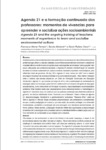Mostrar o rexistro simple do ítem
Agenda 21 e a formação continuada dos professores: momentos de vivencias para apreender e socializar ações socioambientais
| dc.contributor.author | Werner Ferreira, Francesca | |
| dc.contributor.author | Wirzbicki, Sandra | |
| dc.contributor.author | Rubens Cenci, Daniel | |
| dc.date.accessioned | 2019-03-15T08:51:56Z | |
| dc.date.available | 2019-03-15T08:51:56Z | |
| dc.date.issued | 2015 | |
| dc.identifier.citation | Ambientalmente Sustentable, 2015, 20: 857-873. ISSN: 1887-2417 | es_ES |
| dc.identifier.issn | 1887-2417 | |
| dc.identifier.uri | http://hdl.handle.net/2183/22246 | |
| dc.description.abstract | [Resumo] O debate sobre o meio ambiente é dos mais candentes no mundo atual, em decorrência dos eventos ambientais que afetam a vida dos cidadãos. Os conflitos socioambientais constituem o desafio de compreendê-los e enfrenta-los com ações claras e abrangentes sendo essas “preocupações” são pouco articuladas aos conteúdos escolares. A Agenda 21 propõe a transformação do conceito de desenvolvimento sustentável em ações concretas mediante propósitos metodológicos, para diferentes níveis de governos. Em Ijuí, RS a Agenda 21 local, iniciou em 2007 com o desafio de integrar iniciativas de diversas entidades e da comunidade em geral. Para melhor interação entre o coletivo das escolas propôs-se um Ciclo de Formação Continuada em Educação Ambiental e Agenda 21, que ocorreu ao longo de 2014, com a participação de professores da educação básica do município, para retomar e desenvolver um conjunto de ações de educação socioambiental, como instrumento de formação humanista, responsabilidade e sustentabilidade ambiental. Este trabalho relata este processotendo como referencial teórico e metodológico a Agenda 21 nacional e local, em sintonia com as políticas ambientais das diferentes esferas de governo. As oficinas trabalhadas foram: “Vivencias com a Natureza”, Passo a Passo da Agenda 21, Educomunicação, Nivelamento e aprofundamento conceitual, “Pequena ONU” ,Carta da Terra e Agenda 21 Escolar. Essas atividades proporcionaram aos professores a compreensão de que a prática pedagógica é humana e, por esta razão, faz sentido privilegiar uma dimensão humanizadora, possibilita a construção de uma educação com relevância socioambiental, de forma coletiva. Nesse sentido, a Educação Ambiental reflete dois significados: a (re)construção do sentido de humanização como processo coletivo e interdependente e a (re)educação para um novo momento da humanidade na sua relação com a natureza | es_ES |
| dc.description.abstract | [Abstract] The debate on the environment is one of the hottest in the world nowadays, in result of the environmental events that affect the lives of citizens. The environmental conflicts constitute the challenge of understand and confront them with clear and embracing actions, in which those “concerns” are poorly articulated in school subjects. The Agenda 21 proposes the transformation of the sustainable development concept into concrete actions through methodological reasons to different levels of governments, In Ijuí, RS the local Agenda 21, initiated in 2007 with the challenge of integrating the initiatives of various entities and the community in general. For a better interaction between the collective of schools it was proposed a Training Cycle of Continuing Environmental Education and Agenda 21, which happened throughour 2014, with the participation of teachers from the county’s schools of basic education to develop a set of actions of environmental education as a way of humanistic education, responsibility and environmental sustainability. This paper reports this process having as theoretical and methodological references the national and local Agenda 21, in line with the environmental policies of different spheres of the government. The workshops used were: "Vivencias com a Natureza”, Passo a Passo of Agenda 21, Educommunication, Leveling and conceptual deepening, “Pequena ONU”, Carta da Terra and the scholar Agenda 21. These activities have provided the teachers to understand that the teaching practice is human and, therefore, it makes sense to be in favor of a humanizing dimension, enables the construction of an education with social and environmental relevance, in a collective way. In that sense, Environmental education reflects two meaning: the (re)construction of humanization as a collective and interdependent process and the (re)education to a new moment of humanity in its relationship with the nature | es_ES |
| dc.language.iso | por | es_ES |
| dc.publisher | Universidade da Coruña, Servizo de Publicacións | es_ES |
| dc.rights | Atribución-CompartirIgual 3.0 España | es_ES |
| dc.rights.uri | http://creativecommons.org/licenses/by-sa/3.0/es/ | * |
| dc.subject | Educação ambiental | es_ES |
| dc.subject | Agenda 21 | es_ES |
| dc.subject | Environmental education | es_ES |
| dc.title | Agenda 21 e a formação continuada dos professores: momentos de vivencias para apreender e socializar ações socioambientais | es_ES |
| dc.title.alternative | Agenda 21 and the ongoing training of teachers: moments of experience to learn and socialize environmental actions | es_ES |
| dc.type | info:eu-repo/semantics/article | es_ES |
| dc.rights.access | info:eu-repo/semantics/openAccess | es_ES |
| UDC.journalTitle | AmbientalMente Sustentable: Revista científica galego-lusófona de educación ambiental | es_ES |
| UDC.volume | 20 | es_ES |
| UDC.startPage | 857 | es_ES |
| UDC.endPage | 873 | es_ES |
| dc.identifier.doi | https://doi.org/10.17979/ams.2015.02.020.1644 |






